- Home
- Jack Canfield
Chicken Soup for the Cat and Dog Lover's Soul Page 5
Chicken Soup for the Cat and Dog Lover's Soul Read online
Page 5
Once he’d gained the sexton’s friendship and found a way to get regular meals, Bobby lived by the grave of the shepherd unhindered for nine years, until 1867, when the city began to round up all unlicensed dogs. Dogcatchers nabbed Bobby and took him to Edinburgh’s version of the pound.
When the terrier failed to answer the one o’clock gun one day, the innkeeper guessed what had happened. He rescued Bobby from being destroyed by telling the story of the faithful little dog to the city’s Burgher Court. The innkeeper’s plea brought Bobby instant fame, and none other than the Lord Provost of Edinburgh paid for the dog’s license. He even ordered a collar made with an inscription that read, “Greyfriars Bobby. From Lord Provost. 1867. Licensed.”
Sporting his new collar, Bobby had the run of the city. Still, he held to his routine, guarding his master’s grave and dropping by for lunch at the Greyfriars every day at one. Bobby’s fame and popularity spread until he no longer had to hide from visitors—in fact, many visitors came to the cemetery just to see him. More than one artist painted the dog’s portrait as he lay near his master’s simple grave.
In 1872, after maintaining his vigil over Auld Jock’s grave for fourteen years, Greyfriars Bobby, now old and feeble, died. The entire city mourned his death. In secret, the sexton dug Bobby a small grave near Jock’s then marked it with only a rosebush. If the church wouldn’t let dogs visit the cemetery, how could it allow a dog to be buried there?
Upon learning about the inspiring little dog, a Scottish noblewoman, Baroness Burdett-Coutts, commissioned a work to honor Bobby, which would stand on Candle-maker Row, outside the churchyard gates. A year after Bobby’s death, city officials unveiled the monument: a solid granite column, with water from bubbling fountains that poured into two basins; and on top, a bronze likeness of Bobby which faced longingly toward the gates of the cemetery.
At last, in the early 1930s, the church allowed American donors to erect a small stone in the Greyfriars Cemetery marking the grave of the faithful little dog. Today, when you walk inside the gates of the old cemetery, the first headstone you see pays tribute to the endurance of love beyond death. It reads:
Greyfriars Bobby.
Died 14th Jan 1872.
Aged 16 years.
Let his loyalty & devotion
be a lesson to us all.
Tim Jones
A Friend in Need
Brownie and Spotty were neighbor dogs who met every day to play together. Like pairs of dogs you can find in most any neighborhood, these two loved each other and played together so often that they had worn a path through the grass of the field between their respective houses.
One evening, Brownie’s family noticed that Brownie hadn’t returned home. They went looking for him with no success. Brownie didn’t show up the next day, and, despite their efforts to find him, by the next week he was still missing.
Curiously, Spotty showed up at Brownie’s house alone, barking, whining and generally pestering Brownie’s human family. Busy with their own lives, they just ignored the nervous little neighbor dog.
Finally, one morning Spotty refused to take “no” for an answer. Ted, Brownie’s owner, was steadily harassed by the furious, adamant little dog. Spotty followed Ted about, barking insistently, then darting toward a nearby empty lot and back, as if to say, “Follow me! It’s urgent!”
Eventually, Ted followed the frantic Spotty across the empty lot as Spotty paused to race back and bark encouragingly. The little dog led the man under a fence, past clumps of trees, to a desolate spot a half mile from the house. There Ted found his beloved Brownie alive, one of his hind legs crushed in a steel leghold trap. Horrified, Ted now wished he’d taken Spotty’s earlier appeals seriously. Then Ted noticed something quite remarkable.
Spotty had done more than simply lead Brownie’s human to his trapped friend. In a circle around the injured dog, Ted found an array of dog food and table scraps— which were later identified as the remains of every meal Spotty had been fed that week!
Spotty had been visiting Brownie regularly, in a single-minded quest to keep his friend alive by sacrificing his own comfort. Spotty had evidently stayed with Brownie to protect him from predators, snuggling with himat night to keep him warm and nuzzling him to keep his spirits up.
Brownie’s leg was treated by a veterinarian and he recovered. For many years thereafter, the two families watched the faithful friends frolicking and chasing each other down that well-worn path between their houses.
Stephanie Laland
Lucy
The honeymoon was definitely over. Although Larry and I had been married less than a year, we were headed for disaster. My expectations of marriage were high—probably too high. My parents’ relationship had been happy, loving, full of laughter and mutual respect. Larry didn’t come to the marriage with the same kind of dreams, and he felt pressured by my needs. Our home was not a happy one, with tensions, resentment and hurt feelings seething just below the surface. We just couldn’t communicate.
During this rocky time, I had the idea to get a dog. Larry and I talked about it, and he said a dog would be fine, as long as it wasn’t a “yappy little thing.” He had grown up with German shepherds and liked them. I called the local pound and asked if they had a German shepherd who needed a home. It just so happened that they had a white German shepherd mix, so I went right over to see the dog.
At the pound, I made my way to the white dog’s cage. She was part shepherd all right, but the other part must have been Mexican jumping bean. She moved like she had springs on the bottoms of her four paws, continuously jumping five feet in the air and barking enthusiastically— just the way a kid waves his arms and yells, “Pick me! Pick me! Me! Me! Me!” when captains are choosing their teams. I took her out of the run and she tore around the room, stopping only to jump up on me and try to lick my face as she streaked by. I was impressed by her vibrant personality.
I brought Larry to see her a few hours later, and he liked her well enough for us to walk out with her. She strained on her leash, obviously eager to leave the pound behind.
We named her Lucy, and she and I became best friends. I loved getting up in the early morning and walking her when the streets were quiet. A long walk in the park every afternoon became another wonderful part of our daily routine. She liked to be wherever I was, watching me or snoozing in the sun as I went about my housework and gardening. I took her in the car when I went into town to do errands, and she sat in the backseat, her nose stuck out of the window to sniff the wind. I found her company entertaining and comforting. Larry seemed to like her, too.
As the weeks went by, I felt happier and more settled. I have to admit that I talked to Lucy when we were alone together during the day. I even made up silly songs and sang them to her when we were out driving. She seemed to like the sound of my voice, and she wagged her tail and always looked right at me when I told her things. I relished my position at the center of her universe.
One evening, I was showing Larry a silly game that Lucy and I played—I would stand in front of Lucy and poke her with my right hand a few times, then when she was expecting a poke from the right, I’d poke her from the left. Then a poke from the top, and then from the bottom. She seemed to love trying to figure out where my hand would come from next. We were playing this game when Larry came up behind me and started playing, too. I leaned back into the warm bulk of Larry’s chest, and his arms closed around me. We stood like that for a moment, before I turned around and held him tight. We hadn’t done that for a long time.
Things began to fall into place after that. All that canine companionship had enabled me to stop demanding love and attention from Larry—and as I felt happier, I was able to be more loving and certainly more fun to be around. Our wounds began to heal, and our marriage blossomed.
We’ve been married for over ten years now. When people ask me the secret of our happy partnership, I always tell them, “It’s simple. If you want dog-like devotion . . . get a dog!”
r /> Carol Kline
CATHY © 1996 Cathy Guisewite. Reprinted with permission of UNIVERSAL PRESS SYNDICATE. All rights reserved.
Weep Not
The God of the whole gave a living soul
To furred and to feathered thing.
And I am my brother’s keeper.
And I will fight his fight;
And speak for the beast and bird
Till the world shall set things right.
Ella Wheeler Wilcox
If you saw her at all, you’d see her in a cemetery late at night. She’d be clambering about one of those huge cemeteries in Brooklyn and Queens, the ones you can see from certain expressways; graveyards with comforting names like Evergreen, Mount Neboh and Cypress Hills.
She was there on the hottest, stickiest summer night when New Yorkers without air conditioners couldn’t sleep, and she was there when the temperature was below zero and the snow was hip-deep and nobody was awake. Amid the chalk-white and gray polished marble sentries guarding the dead of a great city, Gloria Stradtner looked only for life.
Mrs. Stradtner looked for stray animals: the thousands of dogs and cats abandoned every year by people who, having tired of their pets, thought not of bringing them to an animal shelter but of leaving them in a cemetery. Humans may think of cemeteries as woodland-like sanctuaries. But for animals, they are only places to starve to death in the wild.
But Gloria—as everyone called her—was determined that this was not to be. Not for her strays.
And so for fifty years or maybe more (nobody can remember when she did not make the rounds of the graveyards at night), she would go forth, lugging large bags of dog food and cat food and big and small traps of the type that cannot hurt animals. She would bait these traps and go back to her car and wait. In an hour or so, she would return to her traps. Sometimes, she would entrap a dozen animals or more in a single night, her prisoners of love. And then she would feed them.
Gloria, who was a widow, never had much money, and so to supplement the dog and cat food she bought with her Social Security money, she would take jobs working in catering halls, even when she was getting on in years, so she could scoop up the scraps and bring them to her strays in the graveyards. When she was younger, back in the 1950s, she worked as a clerk and data entry specialist for IBM. But later she did not mind doing menial work in a catering hall. Not if it meant she could feed the animals.
And after she fed them, she would spend the next day making the rounds of veterinarians, imploring their help to neuter the dogs and cats (they usually charged her reduced fees, which she paid with the money from her modest Social Security check). And then she would visit the shelters, asking them to please take and care for the dogs and cats that New Yorkers did not want.
With her puppies and kittens in tow, she sometimes visited animal sanctuaries outside New York City, in Long Island, upstate and in Connecticut and New Jersey, too. Nobody could refuse her. Over the years, she saved thousands of animals.
Sometimes, her friends would go with her on her night visits. And the cemetery workers helped, too. In one cemetery, they built little igloos in the bitterest part of the winter, hoping that Gloria’s strays would use them to keep warm.
Friends told her more than once that cemeteries are not the safest places to be after dark. But she scoffed at such advice.
Once somebody stole her car, which was parked on a Brooklyn street near her home. She called her close friends, Michael and his wife Anne Marie, and told them she didn’t care about the car. She was angry because there was one hundred pounds of dog food in the trunk.
One summer, there was a dog she was worried about. She called the dog Peekaboo because it peeked around gravestones at her. Peekaboo kept having litters. In one delivery, she had ten pups. Gloria was determined that Peekaboo be spayed. But Peekaboo was elusive. She would come when Gloria called her name, but no closer than ten feet. The wild Peekaboo trusted nobody; life in a cemetery does that to a dog.
Then one day Michael spoke to Gloria on the telephone, and he noticed that her speech was slurred. He knew she had not been drinking. She never drank and had not smoked for twenty years.
The doctor said she had cancer. It had started in her lungs and spread to her brain. She was admitted to a hospital and died six weeks later. She was seventy-two years old.
Two days before she died, she called Michael to say that she wanted to make sure that Peekaboo had been spayed (she was) and that her own two dogs, Lance and Ivy, would be taken care of after she died (he promised her they would be).
A poem she was believed to have written was read at her funeral. It was entitled “Weep Not” and began this way:
Do not weep for me when I am gone
For I have friends in the great beyond.
All the little ones I used to feed
Will come to me in my time of need.
They will purr and bark in great delight,
And I will hold and hug them tight.
Oh what a great day that will be
When my furry friends all welcome me.
Richard Severo
Love Makes Us Whole
We got him with the other animals when we purchased the farm. Not that we wanted the black, shaggy mongrel.
We had our hearts set on a collie—a pup we could train for the farm and as a companion for five-year-old Tim. But when the former owners informed us he was part of the deal, we resigned ourselves to keeping him. Temporarily, we thought, just until we can find him another home.
But the big dog apparently considered the farm his permanent responsibility. Each dawn, he inspected the animals and the farm buildings. Then he made a complete circuit of the entire eighty acres. That finished, he bounded across the sloping fields to slip beneath the fence for a visit with old Mr. Jolliff, who lived near a brook at the farm’s edge.
The dog—we learned from Mr. Jolliff that his name was Inky—was pensive and aloof those first weeks. Grieving for his former masters, Inky asked no affection; busy settling in, we offered none. Except Tim, who sat by the hour on the back steps, talking softly to the unresponsive animal. Then, one morning, Inky crept close and laid his head in the boy’s lap. And before we knew it, he had become Tim’s second shadow.
All that summer the boy and the dog romped through fields and roamed the woods, discovering fox dens and groundhog burrows. Each day, they brought back treasures to share.
“Mom, we’re home!” Tim would shout, holding the screen door wide for Inky. “Come see what we’ve got!” He’d dig deep in his jeans and spread the contents on the kitchen table: a pheasant’s feather; wilted buttercups with petals like wet paint; stones from the brook that magically regained their colors when he licked them.
September arrived all too soon, bringing with it school for Tim and Carl, my schoolteacher husband, and lonely days for Inky and me. Previously, I’d paid little attention to the dog. Now he went with me to the mailbox, to the chicken coop, and down the lane when I visited Mr. Jolliff.
“Why didn’t they want to take Inky?” I asked Mr. Jolliff one afternoon.
“And shut him up in a city apartment?” Mr. Jolliff replied. “Inky’s a farm dog; he’d die in the city. Besides, you’re lucky to have him.”
Lucky? I thought ruefully of holes dug in the lawn, of freshly washed sheets ripped from the clothesline. I thought, too, of litter dumped on the back porch: old bones, discarded boots, long-dead rodents.
Still, I had to admit that Inky was a good farm dog. We learned this in early spring when his insistent barking alerted us to a ewe, about to lamb, lying on her broad back in a furrow, unable to rise. Without Inky’s warning, she’d have died. And he had an uncanny way of knowing when roving dogs threatened the flock, or when sheep went astray.
Inky’s deepest affection was reserved for Tim. Each afternoon when the school bus lumbered down the road, Inky ran joyously to meet it. For Inky—and for Tim—this was the high point of the day.
One mid-October day when
I had been in town, Tim rode home with me after school. He was instantly alarmed when Inky wasn’t waiting for us by the driveway.
“Don’t worry, Tim,” I said. “Inky always expects you on the bus, and we’re early. Maybe he’s back by the woods.”
Tim ran down the lane, calling and calling. While I waited for him to return, I looked around the yard. Its emptiness was eerie.
Suddenly I, too, was alarmed. With Tim close behind me, I ran down to the barn. We pushed the heavy doors apart and searched the dim coolness. Nothing. Then, as we were about to leave, a faint whimper came from the far corner of a horse stall. There we found him, swaying slightly on three legs, his pain-dulled eyes pleading for help. Even in the half-light I saw that one back leg hung limp, the bone partially severed. With a little moan, Tim ran to Inky and buried his face in the dog’s neck.
By the time the vet arrived, Carl was home. We placed the dog on his blanket and gently lifted him into the pet ambulance. Inky whimpered, and Tim started to cry.
“Don’t worry, son,” the vet said. “He’s got a good chance.”
But his eyes told a different story.
At Tim’s bedtime, I took him upstairs and heard his prayers. He finished and looked up. “Will Inky be home tomorrow?”
“Not tomorrow, Tim. He’s hurt pretty bad.”
“You tell me that doctors make people well. Doesn’t that mean dogs, too?”
I looked out across the fields flooded with amber light. How do you tell a little boy that his dog must either die or be crippled? “Yes, Tim,” I said at last. “I guess that means dogs, too.” I tucked in his blanket and went downstairs.
I tossed a sweater over my shoulders and told Carl, “I’m going down to Mr. Jolliff’s. Maybe he’ll know what happened.”

 Chicken Soup for the Nurse's Soul: Second Dose
Chicken Soup for the Nurse's Soul: Second Dose Chicken Soup for the Ocean Lover's Soul
Chicken Soup for the Ocean Lover's Soul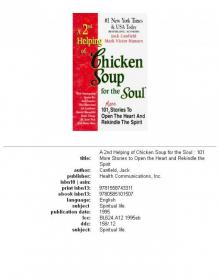 A 2nd Helping of Chicken Soup for the Soul
A 2nd Helping of Chicken Soup for the Soul Chicken Soup for the Nurse's Soul
Chicken Soup for the Nurse's Soul Chicken Soup for the Breast Cancer Survivor's Soul
Chicken Soup for the Breast Cancer Survivor's Soul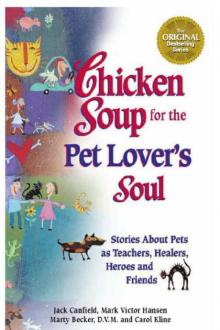 Chicken Soup for the Pet Lover's Soul
Chicken Soup for the Pet Lover's Soul Chicken Soup for the Bride's Soul
Chicken Soup for the Bride's Soul A Chicken Soup for the Soul Christmas
A Chicken Soup for the Soul Christmas Chicken Soup for the Soul of America
Chicken Soup for the Soul of America Chicken Soup for the Teenage Soul on Tough Stuff
Chicken Soup for the Teenage Soul on Tough Stuff A Taste of Chicken Soup for the Teenage Soul III
A Taste of Chicken Soup for the Teenage Soul III Chicken Soup for Every Mom's Soul
Chicken Soup for Every Mom's Soul Chicken Soup for the Dog Lover's Soul
Chicken Soup for the Dog Lover's Soul A Second Chicken Soup for the Woman's Soul
A Second Chicken Soup for the Woman's Soul Chicken Soup for the Soul the Book of Christmas Virtues
Chicken Soup for the Soul the Book of Christmas Virtues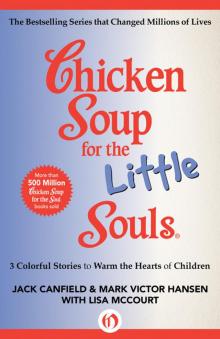 Chicken Soup for the Little Souls: 3 Colorful Stories to Warm the Hearts of Children
Chicken Soup for the Little Souls: 3 Colorful Stories to Warm the Hearts of Children Chicken Soup for the African American Woman's Soul
Chicken Soup for the African American Woman's Soul Chicken Soup for the Soul
Chicken Soup for the Soul Chicken Soup for the Soul Celebrates Teachers
Chicken Soup for the Soul Celebrates Teachers Chicken Soup for the College Soul
Chicken Soup for the College Soul Chicken Soup for the Recovering Soul Daily Inspirations
Chicken Soup for the Recovering Soul Daily Inspirations Chicken Soup for the Soul Celebrates Sisters
Chicken Soup for the Soul Celebrates Sisters Chicken Soup for the Dieter's Soul
Chicken Soup for the Dieter's Soul Chicken Soup for the Soul at Work 101 Stories of Courage
Chicken Soup for the Soul at Work 101 Stories of Courage Chicken Soup for the Beach Lover's Soul
Chicken Soup for the Beach Lover's Soul Stories About Facing Challenges, Realizing Dreams and Making a Difference
Stories About Facing Challenges, Realizing Dreams and Making a Difference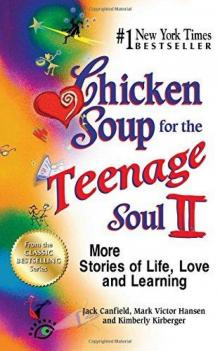 Chicken Soup for the Teenage Soul II
Chicken Soup for the Teenage Soul II Chicken Soup for the Girl's Soul
Chicken Soup for the Girl's Soul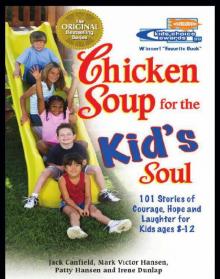 Chicken Soup for the Kid's Soul: 101 Stories of Courage, Hope and Laughter
Chicken Soup for the Kid's Soul: 101 Stories of Courage, Hope and Laughter Chicken Soup for the Woman's Soul
Chicken Soup for the Woman's Soul Chicken Soup for the Cancer Survivor's Soul
Chicken Soup for the Cancer Survivor's Soul Chicken Soup for the Canadian Soul
Chicken Soup for the Canadian Soul Chicken Soup for the Military Wife's Soul
Chicken Soup for the Military Wife's Soul A 4th Course of Chicken Soup for the Soul
A 4th Course of Chicken Soup for the Soul Chicken Soup Unsinkable Soul
Chicken Soup Unsinkable Soul Chicken Soup for the Soul: Christmas Magic
Chicken Soup for the Soul: Christmas Magic Chicken Soup for the Grandma's Soul
Chicken Soup for the Grandma's Soul Chicken Soup for the Soul: All Your Favorite Original Stories
Chicken Soup for the Soul: All Your Favorite Original Stories Chicken Soup for the Expectant Mother's Soul
Chicken Soup for the Expectant Mother's Soul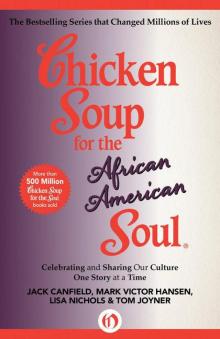 Chicken Soup for the African American Soul
Chicken Soup for the African American Soul 101 Stories of Changes, Choices and Growing Up for Kids Ages 9-13
101 Stories of Changes, Choices and Growing Up for Kids Ages 9-13 Christmas Magic
Christmas Magic Chicken Soup for the Soul: Children with Special Needs
Chicken Soup for the Soul: Children with Special Needs Chicken Soup for the Soul: Country Music: The Inspirational Stories behind 101 of Your Favorite Country Songs
Chicken Soup for the Soul: Country Music: The Inspirational Stories behind 101 of Your Favorite Country Songs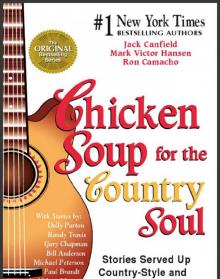 Chicken Soup for the Country Soul
Chicken Soup for the Country Soul Chicken Soup for the Recovering Soul Daily Inspirations (Chicken Soup for the Soul)
Chicken Soup for the Recovering Soul Daily Inspirations (Chicken Soup for the Soul)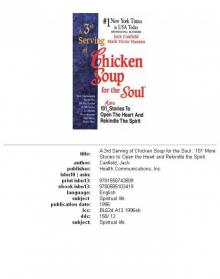 A 3rd Serving of Chicken Soup for the Soul
A 3rd Serving of Chicken Soup for the Soul The Book of Christmas Virtues
The Book of Christmas Virtues Chicken Soup for the Soul at Work
Chicken Soup for the Soul at Work Chicken Soup for the Soul 20th Anniversary Edition
Chicken Soup for the Soul 20th Anniversary Edition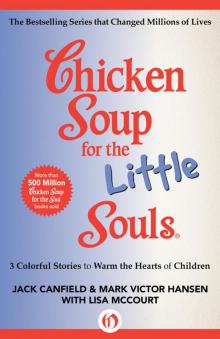 Chicken Soup for the Little Souls
Chicken Soup for the Little Souls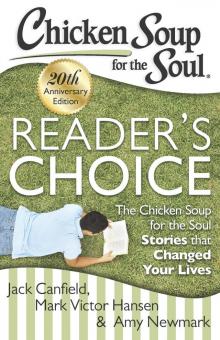 Chicken Soup for the Soul: Reader's Choice 20th Anniversary Edition
Chicken Soup for the Soul: Reader's Choice 20th Anniversary Edition Chicken Soup for the Soul Christmas
Chicken Soup for the Soul Christmas Taste of Chicken Soup for the Teenage Soul III
Taste of Chicken Soup for the Teenage Soul III Chicken Soup for the Unsinkable Soul
Chicken Soup for the Unsinkable Soul Chicken Soup for the Preteen Soul II
Chicken Soup for the Preteen Soul II